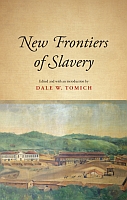New Frontiers of Slavery
Author(s)
Tomich, Dale W.
Collection
Knowledge Unlatched (KU)Language
EnglishAbstract
Essays challenging conventional understandings of the slave economy of the nineteenth century.The essays presented in New Frontiers of Slavery represent new analytical and interpretive approaches to the crisis of Atlantic slavery during the nineteenth century. By treating slavery within the framework of the modern world economy, they call attention to new zones of slave production that were formed as part of processes of global economic and political restructuring. Chapters by a group of international historians, economists, and sociologists examine both the global dynamics of the new slavery, and various aspects of economy-society and master-slave relations in the new zones. They emphasize the ways in which certain slave regimes, particularly in Cuba and Brazil, were formed as specific local responses to global processes, industrialization, urbanization, market integration, the formation of national states, and the emergence of liberal ideologies and institutions. These essays thus challenge conventional understandings of slavery, which often regard it as incompatible with modernity.Dale W. Tomich is Deputy Director of the Fernand Braudel Center for the Study of Economies, Historical Systems, and Civilizations, and Professor of Sociology and History at Binghamton University, State University of New York. He is the author of Through the Prism of Slavery: Labor, Capital, and World Economy.
Keywords
Social Science; Sociology; History; Latin America; History; Modern; 19th Century; Technology & Engineering; AgricultureDOI
10.1353/book.83858ISBN
9781438458656Publisher
State University of New York PressPublisher website
http://www.sunypress.edu/Publication date and place
2016Imprint
SUNY PressSeries
SUNY Press Open Access,Classification
Sociology
History of the Americas
General and world history
Agriculture and farming


 Download
Download